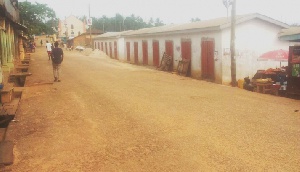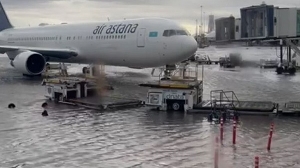- Home - News
- TWI News | TV
- Polls
- Year In Review
- News Archive
- Crime & Punishment
- Politics
- Regional
- Editorial
- Health
- Ghanaians Abroad
- Tabloid
- Africa
- Religion
- Election 2020
- Coronavirus
- News Videos | TV
- Photo Archives
- News Headlines
- Press Release
Opinions of Thursday, 7 April 2016
Columnist: Ben Mensah
Where is Agona Duakwa?
When news broke of the arrest of three South African nationals, described variously as terrorists or mercenaries, at the El Capitano Hotel at Agona Duakwa, many were those who wondered where Agona Duakwa is. Ben Mensah, a journalist, and native of Duakwa provides the story behind the news.
A couple of weeks ago, if I had started this piece by stating that I am a native of Agona Duakwa, it would have been normal for many to interject, ‘and so what?’. Doesn’t every Ghanaian come from this or that village or town in the country? Or is Duakwa a town where Sinatra would sing ‘never sleeps?’. Whatever the answer, I can say emphatically that today it is only the uninitiated who wouldn’t be curious about Agona Duakwa.
About Agona Duakwa
Agona Duakwa is not only a town (Kurow) of considerable size; indeed, Agona Duakwa ‘has been and is still in town’ – Agona Duakwa wo kurom. On radio, television, newspapers, social media, gossip, etc. Agona Duakwa has and still is featuring in the media more than any other town in Ghana today. As a native, who is so much in love and proud of my roots, I should normally be happy with the new-found status of Agona Duakwa. But no! Agona Duakwa is in the news for the wrong reason.
Three weeks ago, the Daily Graphic published an official statement that three retired South African police officers had been picked up at Agona Duakwa in the Central Region for allegedly engaging in activities with national security implications. The three were picked up at the El Capitano Hotel where they were said to be training some young men in various security drills including unarmed combat, weapon handling, VIP protection techniques and rapid response manoeuvres.
Other news media latched on to the story and, instantly, Agona Duakwa became a celebrity.
But this fact of celebrity status was lost on most of the media who failed to educate their listeners and readers about the profile of Agona Duakwa, thereby denying them a vital perspective to the story.
Some of the newscasters even ignorantly referred to Duakwa as Dunkwa. Only one radio station interviewed the chief of the town, Nana Kojo Amuakwa, also known as Nana Duncan, a University lecturer and former head of Public Relations of the Ghana Commercial Bank.
Nana confirmed the location of El Capitano Hotel in his town and how magnificent the facility was. He added that as the finest and most modern hotel in the area, comparable to standards in even Accra, El Capitano hotel has helped to open up Duakwa to very important personalities from far and near.
If the interview had allowed it, I bet Nana would have continued to crow about the many sterling achievements and landmarks which have made Duakwa famous in contemporary history. For example, a son of Agona Duakwa, King Hudson (also known as Amoako Atta), a missionary who travelled to England, returned home to establish the Salvation Army church in the then Gold Coast. Today, the church runs one of the finest health facilities in the country at Agona Duakwa in memory of King Hudson.
Agona Duakwa also boasts a celebrated chief, Nana Kojo Amuakwa I, who in 1929 established the first private national school in the country, paid the teachers from his own resources and offered scholarships to needy students from far and near. He was also a pioneer in providing his people with electricity from a generating plant he bought at a time most towns in the country were dependent on kerosene.
My mother’s house is in the area of the town called Power House, where Nana Amuakwa installed the generating plant. No wonder, in 2007, on the occasion of the nation’s golden jubilee celebration, the chiefs of the Agona kingdom, including the Omanhen, nominated the late chief to be honoured by the Agona District Assembly as the most eminent chief of his time.
As a student, I had friends from places such as Simpa (Winneba), Oguaa (Cape Coast), Akyenfo (Saltpond), Edina (Elmina), etc. One day one of my friends asked what the English name of my hometown Duakwa is. Before I could react, another hastened “Mere Tree.” From then on Mere Tree became my nickname and later my pen name for some of my writings. But the etymology of Duakwa derives from the story of the early settlers who, barred from their search for water by an uprooted massive Bako tree, diverted their route, (translates in Fante as Yi dua no akwa).
The people
Duakwa is 10 kilometres from Agona Swedru, the commercial capital of the area, on the main road to Akyem Oda. It is the Kronti division of the Agona Nyakrom Traditional Area. The people of the area are known as Agonas, even though they are not homogenous. The early settlers of each Agona town arrived from the 14th century from various parts of the country, mostly from Takyiman in Brong Ahafo, Kuntanase, Kokoben, Agona in Asante and Akwamu. There were also Guan settlers. The Agona state shares boundaries with Gomoa, Akyem, Awutu, Breman, and Ajumako.
The main occupation of the people of Agona Duakwa is farming, mainly in cocoa and also maize, oil palm, plantain, and cassava. A smattering of monthly salaried workers can be found in the morning walking along the streets of the town to their offices at the branch of the Agona Rural Bank or Pioneer Water Purifying Complex.
There are also reverend ministers and pastors of the local churches, lotto operators, an information officer, cocoa purchasing clerks, chemical sellers and hordes of shopkeepers and market women. There is a post office, a police station, headed by an inspector, and the Salvation Army Church Hospital. However, the bulk of workers are teachers of the many primary and vocational schools in the town, some privately owned.
The hotel
Retired Captain Acquah of the Ghana Army is one of many educated people in Agona Duakwa. Without mentioning names, Duakwa has also produced editors, university professors, doctors, lawyers, a diocesan bishop, engineers, nurses, musicians, ministers of state, parliamentarians, district/municipal chief executives, company directors, consultants, industrialists, etc.
Captain Acquah is the owner of the El Capitano Hotel which is in the news in connection with the saga of three South African nationals who have been deported from the country. El Capitano (The Captain) Hotel lies about one kilometre from the centre of Duakwa, on a tarred road towards Mankrong. From Accra, you can access this magnificent facility without passing through Duakwa. The exquisitely manicured and paved grounds of the hotel present a scenery which is simply idyllic and mind-blowing. I have visited the place a few times and love it.
In 2007, I hosted, as the then Municipal Chief Executive for the area, the Regional Minister, Mr Ato Arthur, and the Minister of Local Government, Mr Asamoah Boateng, at the joint. We were so impressed with the layout that we suggested to Captain Acquah to speed up construction and make it ready for use as a venue to receive one of the competing teams in the African Cup of Nations in 2008.











